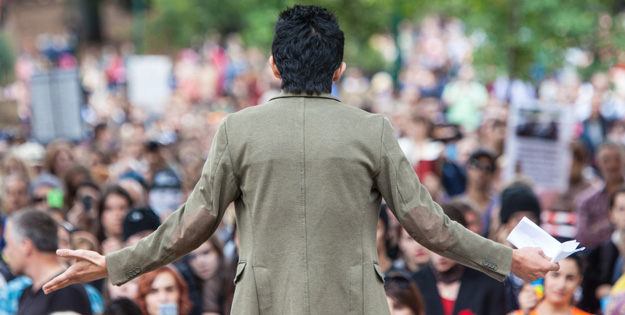Community
Copyright@ Australian Catholic University 1998-2026 | ABN 15 050 192 660 CRICOS registered provider: 00004G | PRV12008
Copyright@ Australian Catholic University 1998-2026 | ABN 15 050 192 660 CRICOS registered provider: 00004G | PRV12008

Sixteen and 17 year-olds can leave school, work, drive and pay taxes. So why don’t they have the right to vote? Mark Chou, associate professor in politics at ACU, talks to Impact about why the time may have come to lower the voting age in Australia.
When you picture life at age 16 or 17 it’s easy to imagine study, chores, and the odd sneaky rebellion. Fulfilling civic duty does not come front of mind.
But perhaps it should.
Although Parliament recently shut down a bill that tried to push for the voting age to be lowered in Australia, momentum on the issue is gathering pace.
Associate Professor Mark Chou explains why it’s a positive move.
“We value the input of older teenagers into society and their capacity to make decisions for themselves and others. They already have a number of political rights and responsibilities. They can drive, pay taxes and join the military. Extending them the right to vote cements their place as key members of society.”
Shifting power
If the bill had passed, Associate Professor Chou says it was an opportunity to be more inclusive and representative.
But what would that surge in around 600,000 additional votes do to the make-up of our parliament?
Early indications are that young voters are more inclined to support parties from the ‘left’ over conservatives. One poll found that 44 per cent of 17 to 25 year-olds supported the Greens. Labor support would remain the same. Numbers like these suggest that lowering the voting age could effect a dramatic change in our political landscape.
But, before young voters can shake-up the make-up of our parliament, they first have to show up.
A matter of interest
A big question being asked in the voter-age debate is whether young people are engaged enough in politics to even want the vote. At first glance the statistics don’t look promising.
In the last federal election some 400,000 eligible first-time voters didn’t even enrol.
However studies from around the world suggest that 16 and 17 year-olds cannot be put in the same bucket as the over 18s. The studies show that not only will they vote, they will vote in much larger numbers than older first-time voters.
“Places like Austria, which has extended 16 year-olds the right to vote, show that younger first-time voters are significantly more likely to participate in elections than first-time voters between the age of 18 to 20,” says Associate Professor Chou.
It’s a similar story in Scotland where the legal voting age was lowered for the 2014 Scottish independence referendum. Seventy-four per cent of 16 and 17 year-olds voted, compared to 54 per cent of 18 to 24 year-olds.
So why are younger voters so much more engaged? One school of thought is that they benefit from a supportive home and school environment.
“Typically, they have access to a network of family and teachers who can help socialise them into the practice of voting at elections.”
And even drive them to the voting centre.
On the other hand, first-time voters over the age of 18 are more likely to be out of home and left to their own devices, navigating this new responsibility by themselves.

Addressing a student rally
Associate Professor Chou adds, as a word of warning, that better engaged doesn’t necessarily mean better informed.
“The key danger is that younger voters may participate, but not be educated or politically competent enough to make the 'right' choices.” However, he goes on to explain that is just as true for older voters.
"Indeed, if political competence was used to deny citizens the right to vote, then US and Australian research tells us that a good number of citizens, of any age, wouldn't be qualified to take part in elections.”
When Nicola Hames, 17, made her submission to the Senate inquiry, she argued the same point.
“I want to make an informed choice, having examined each movement of all candidates closely, but I am not allowed, and my parents can make a few quick marks, go get a sausage sizzle and be none the wiser about the decision they have just made, which could potentially put people at risk,” said Nicola.
The answer, says Associate Professor Chou, is ensuring young voters have a strong civics and citizenship education, which would not only engage them for their first voting experience, ensure long-term political participation.
Taking ownership
A recurring theme in the submissions to the Senate is the desire for students to have a say in decisions that will have a direct impact on their future.
One group of senior high school students wrote, “Young people are the ones who will have to deal and live with the choices that our parliament make today, so it only makes sense that we start including them in our parliament’s decisions.”
Without the ability to vote, those with passionate views instead express themselves through protest, such as the School Strike 4 Climate or March For Our Lives. They were vocal, they were prominent but were they heard?
Senator Steele-John believes that if young people are ignored during their time of political awakening, there is a risk they will disengage with the system permanently.
“The major parties view the perceived disengagement of young people as politically convenient but what this approach is doing is turning a generation, who cares deeply about the future, away,” said Senator Steele-John.
The debate over lowering the voting age is not unique to Australia. Britain, Malta, New Zealand and the US have all mooted the topic in recent times.
In Britain, in particular, the issue will not rest, with many claiming that the Brexit referendum could have had a different outcome if 16 and 17 year-olds were able to vote. As it was, only two-thirds of 18 to 24 year-olds turned out to vote, and the leave result was largely swung by the over-60s.
In the US, youth-led activism on gun control and climate change has also sparked debate on lowering the voting age. And while a recent attempt to amend the For the People Act failed, the conversation is still not over.
Then there are the countries that have already taken the leap. Argentina, Austria, Brazil and Ecuador lowering the voting age to 16 and East Timor, Greece and Sudan lowering it to 17.
For Associate Professor Chou, lessons learnt from these countries makes it clear.
“The evidence shows that if we lower the voting age, not only will young people engage themselves in political matters, they’ll continue to do so throughout their lives.”
To the Senate Inquiry’s credit, says Associate Professor Chou, the bill was not rejected because they saw young people as immature or unwilling to engage, instead, “They felt that extending 16 and 17 year-olds the vote on a voluntary basis, as the bill proposed, posed a ‘potential danger’ to our system of compulsory voting.”
Despite this hurdle, Associate Professor Chou is confident the issue has not gone away.
“Labor has recommended the committee revisits this issue as part of its review of the 2019 election. There is still momentum and the issue is still very much alive,” he said.
Mark Chou is an associate professor in politics at ACU with teaching and research interests in global politics, political theory, democracy, and cultural politics.

Copyright@ Australian Catholic University 1998-2026 | ABN 15 050 192 660 CRICOS registered provider: 00004G | PRV12008